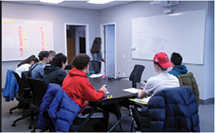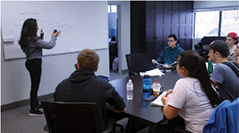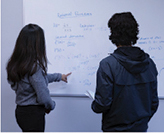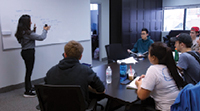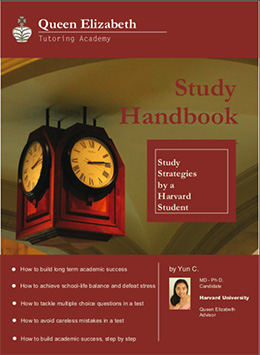High Quality High School Credits
Queen Elizabeth Academy is a premier education facility providing high-quality academics for our students. We focus on building a sound foundation for our students preparing for successful entry to top universities.
Over the past 9 years, we worked with thousands of students, many of whom were admitted to top universities: Waterloo, Queen’s, Western, Laurier, and McGill, with scholarships from $2,000 to $23,000.
Ministry of Education curriculum and policy:
https://www.edu.gov.on.ca/eng/document/curricul/curricul.html
Explanations
Our focus is to build step by step on the students’ understanding of the materials. We turn complex concepts into simpler steps for our students to absorb and understand.
Foundations:
For our students who are applying to universities, building a better foundational knowledge is key to success.
We structure a work period in each of our lessons that our teachers walk around and help each student one by one. In our online live class, each student will get a ‘slice’ of time, where our teacher will enter their virtual room, to work with them one by one. This will help clarify any misunderstanding immediately.

ACHIEVERS
| Jeff R. | Queen’s Commerce |
| Paul M. | Queen’s Engineering |
| Melissa W. | Western Ivey |
| Taylor W. | Western Medical Science |
| Josh M. | OCAD |
| Miranda D. | Wilfred Laurier BBA (Co-op) |
| Colin H. | Queen’s Commerce |
| Stephanie L. | Queen’s Commerce |
| Jeremy R. | Western Ivey |
| Robbie M. | Wilfrid Laurier BBA (Co-op) |
| Eric M. | Wilfrid Laurier BBA (Co-op) |
| Jiv S. | Wilfrid Laurier BBA (Coop) |
| Vivian T. | U of T Rotman |
| Stacy L. | Western Engineering |
| Laura P. | Western Medical Science |
| David P. | U of T Rotman |
| Britney R. | Wilfred Laurier BBA (Co-op) |
| Monika S. | Western Health Science |
| Lisa V. | U of T Architecture |
| Katie F. | McGill Arts |
| Carter S. | Western Ivey |
| James B. | Wilfred Laurier BBA |
| Sydney H. | Queen’s Engineering |
| Brianna M. | Waterloo Science |
| Sam A. | Queen’s Science |
| Bill N. | Waterloo Mathematics |
| Catherine M. | McGill Engineering |
| Jennifer F. | Queen’s Commerce |
| Craig C. | Western Engineering |
| Allen T. | Queen’s Engineering |

Teaches: English grade 5 to 12
PhD Candidate, English literature
Writing Course Director, Guelph-Humber University
Harvard University
Queen Elizabeth Advisor
Designed Learning Strategies for our courses.
Teaches: Calculus, Advanced Functions, Physics
PhD Candidate, University of Toronto
Taught university math tutoring classes for 2+ years
Teaches: Advanced Functions
1200+ hours of tutoring experience. Specialized in making complex concepts easy to understand

Teaches: Calculus, Grade 9-12 Math
Certified Teacher, Mathematics.
6 years of university teaching experience as a TA

Teaches: Chemistry, Math 9-12
Recipient of E.A. Robinson Medal. Rank#1 in Science, University of Toronto
TA teaching first year university tutorial
Queen Elizabeth Academy!

Victor is excellent at communicating with parents and students and he is also very good at listening and acting on everyones feedback. Highly recommend QEA!!read more
Private Credit Course offered at-a-glance and study tips
This is a very important course for many students because most university programs require this course as a pre-requisite. The skills learned in the Grade 11 course are built upon in this course, including factoring, graphing, trigonometry and exponents. Students will likely have varying levels of proficiency when taking this course, as some units, such as polynomial functions, are quite simple, while others, such as trigonometry and proofs. Some students have thus described it as a roller coaster ride of a course, with all the thrills (and challenges) that that entails.
It would be a good idea, before the beginning of this course, to brush up on the foundations of mathematics, such as factoring (especially trinomial factoring), domain and range, graphing, adding rational expression, and trigonometry ratios. If you wait until the course beings, it may be difficult to keep pace with the new material which is being taught. Foundations are always important, and as with all mathematics courses, this one builds upon your past knowledge, so be sure to review.
Also, make sure to keep good, organized notes to stay on top of the course units. Do not be afraid to practice problems beyond those assigned in the homework, as Advanced Functions is known for containing a very wide variety of questions and problems, and therefore the more you expose yourself to such problems, the better prepared you will be. Because of this, the Queen Elizabeth Academy provides all of our students with extra worksheets and practice tests to hone their skills and succeed.
This course includes two different sections, one is derivative, or rather extends from work in Advanced Functions, while the other is Vectors, which is completely new. Vector bears some resemblance to Physics in terms of problem solving.
The derivative section will branch out from the work done in Advanced Functions and will include algebra, graphing, trigonometry and logarithms.
The vector component is entirely new, involving 3D equation of lines and planes. The problem-solving aspects of vectors are similar to physics, and many students find this component of the course particularly difficult.
In order to succeed in Vector Calculus, make sure you are proficient in exponents, factoring, combining rational expressions such as fractions with algebra, and solving equations.
Make sure to pay special attention to the Optimization Unit, which includes many word problems. If you struggle with word problems, make sure to prepare for this unit in particular. As always, make sure to keep your notes organized. Identify the different kinds of problems. This will help you to clarify the concepts in this course significantly, and also help to keep track of your progress.
When approaching vectors, the concepts are highly complex. To address this, try to layout and write down all of the steps clearly, and write down why you are taking such steps as well. What variable are you attempting to achieve at every step? This approach will simplify some of the more complex questions, and will also allow you to pinpoint areas in which you will require extra help.
Grade 12 Chemistry is one of the most challenging courses in Ontario high schools, along with Physics. Building upon the knowledge acquired in Grade 11 Chemistry, many of the questions are based upon possible situations since Chemistry deals with so many diverse elements (ie. The energy produced from chemical X and Y’s reaction).
Many students are unused to this kind of problem-solving strategy, preferring step-based, or formulaic ‘plug-in’ problems. However, if you are pursuing science in university, this kind of problem-solving will have to be learned.
The concepts within Grade 12 Chemistry are quitter complex, including enthalpy, orbitals, equilibrium and organic nomenclature, which is a particular challenge for many students.
An important tip to remember when studying chemistry is not to become lost in details. Always keep an eye on the ‘big picture’ concepts in any given unit. A good way to visualize these concepts is to organize them into a flow chart. This will allow you to see how concepts are related to one another, and will help with tests significantly.
Always try to understand the “why” behind a concept, or rather ‘why’ a concept is important beyond mere memorization. For example, the boiling point of an organic compound can indicate the intermolecular force that is the force of attraction between molecules. Understanding these concepts will allow you to adapt to situational problems in chemistry.
Physics is often taken for those seeking to pursue engineering in university. Grade 12 Physics is an extension of grade 11 Physics, and if a student has done well in the previous grade, it is likely they will, with hard work of course, succeed in Grade 12 Physics.
This course begins with a review of Kinematics (motion) and Dynamics (forces), which will provide a strong start. Electromagnetism and Light are often the most challenging units.
In Grade 12 Physics there will be the expectation to excel at problem-solving techniques, especially in the manipulation of equations to extract unknowns and answers.
The workload in this course is quite heavy, requiring a considerable dedication of time in order to achieve above 85 percent, however with the right mindset, this course will be very rewarding.
Physics will require a great deal of practice, and it is advisable to dedicate around 6 hours a week to work through new problems if you desire to achieve above 85% in the course.
Some of the units in Grade 12 Physics are conceptually difficult, such as electromagnetism and light. To better understand a concept, try first to put it into plain English. Imagine that you are explaining this concept to a space alien, or your grandmother. What would you say? What is an electric field? What is Voltage? If you are able to understand the concept, and are not merely memorizing equations, it will make understanding equations and problems much easier.
Grade 11 Mathematics represents an important stepping stone in progressing to the 12th grade. Students at this stage are often at a crossroads, namely whether to take the Mixed level course or the Academic level course. My advice to students would be to stick with the Grade 11 Academic Math, even if it requires a bit more work or a summer upgrade. This course will open many doors to university programs ranging from engineering to business and many others. Unless a student is absolutely certain of the path they wish to take, it is probably better to stick with the more flexible option.
There are many challenging units in grade 11 Math including exponents, transformation, trigonometry graphing, and trigonometry identities (the first time you will encounter proofs).
The simpler units include Quadratics, which is mostly a review of grade 10 material, and series and sequences.
Before taking this course, try to strengthen your foundational skills from grade 10. Key skills include factoring (especially trinomials), fractions (grade 8-9 level), Linear systems and quadratics with a good understanding of domain and range, x and y intercepts and asymptotes. With foundational skills down it will be easier to follow the lessons and work in this course, and less time will be spent catching up on previous material.
Many grade 11 questions involve multiple steps. Ensure you understand why you are undertaking each step from a logical perspective, and then pinpoint the goal of the steps, that is to say as ‘what am I trying to solve?’ Work through the steps after you have done this. By breaking the problems into steps, the questions will seem less overwhelming.
Grade 11 Chemistry involves a combination of theoretical and technical knowledge. You must be proficient in both areas to do well in the course. The majority of grade 11 Chemistry involves a great deal of calculations, and therefore a solid background in Math will make this course much easier. Grade 11 Chemistry is not particularly difficult, and it is a good way to explore the possibility of pursuing chemistry, or science more generally, in the future.
Grade 11 Chemistry involves a combination of theoretical and technical knowledge. You must be proficient in both areas to do well in the course. The majority of grade 11 Chemistry involves a great deal of calculations, and therefore a solid background in Math will make this course much easier. Grade 11 Chemistry is not particularly difficult, and it is a good way to explore the possibility of pursuing chemistry, or science more generally, in the future.
It is a good idea to review Nomenclature and how to Balance Equations from Grade 10 science before proceeding to Grade 11 Chemistry. These are two absolutely essential skills in the course.
Once you come to the units in the course which involve calculations, make sure you lay out all of the steps individually, or else use a flow chart, with each box indication your result for each step, such as the values for mass of a chemical, volume of a gas or the number of particles. This can eliminate confusion, and help to isolate areas of confusion.
Grade 11 Physics can be a very challenging course as the material along with the strategies for problem solving will be very new for many students. Rather than following concrete steps, as in Math, students will need to know which equations to use beforehand, and will need to know how to manipulate different equations to achieve their desired result.
Physics also involves many word problems which can pose another challenge, however the good news is that you will slowly gain proficiency in extracting givens and variables.
This course is important for those who wish to pursue engineering or science in university, and is a prerequisite for Grade 12 Physics.
It is important not to simply memorize the equations. It is far better to understand the reasoning behind such equations. Try to visualize the situation and identify variables and given in each different problem. Make sure you are tailoring your use of equations to the question at hand, and not just blindly following steps or processes.
In many cases you have to use multiple equations and combine them in different stages. For each equation, tick the variables that you have a number to insert and circle the ones that don’t. Then try to use another equation to find the circled unknown. This tip can guide you through the confusion
Grade 10 is a large leap in difficulty from Grade 9, especially for those who scored 75% or lower in Grade 9. Many new concepts are introduced, such as quadratics and geometry.
Common challenges in Grade 10 Math include thinking problems and word problems. Students need to strengthen their foundational skills for Grade 10, especially if they have gaps in their grade 8 and 9 learning. Such gaps include integers, fractions, and linear equations. Students must work diligently in these areas in order to proceed on to grade 11 Math successfully.
It is a good idea to organize problems into types. This will help you to determine which problems give you the most difficulty, and then you will be able to focus on those ones.
Also, make sure to spend a considerable amount of time practicing beyond what has been assigned by the teacher. A grade 10 Math students should look to do about 5 hours of work a week in order to do very well on the course. Also, always avoid, if you can, last minute studying before the test. You will be better off if you accumulate your skill and knowledge on a regular basis.
Grade 9 Math is a significant departure from Grade 8 Math. Many students do not expect this and thus maintain a Grade 8 work ethic in high school.
The four categories of Knowledge, Application, Thinking and Communication are now introduced, and many are not accustomed to this marking scheme.
The course is also more word problem heavy than the middle school courses, possibly causing a significant drop in marks if not dealt with quickly. Many students are discouraged by a bad test and then give up, believing they are not good enough at math to do better. The good news is that this is a myth, and good marks will come to those students who put the work in and take the course seriously.
Try to create a regular work schedule and maintain it. A student should spend roughly 4 hours a week on math homework to succeed in this course. Math requires constant practice, and thus a steady work schedule is important to achieve desired goals in this course.
Also, make sure to spend a good deal of time addressing word problems, as word problems are going to be important, not just in grade 9, but throughout high school. They cannot be avoided!
at your neighbourhood
*Note that Queen Elizabeth Academy offers in class learning at our Mississauga location, at Unit 5, 1020 Johnson’s Lane. The rest of the locations we offer credits online via Zoom (TM) with live teaching.

